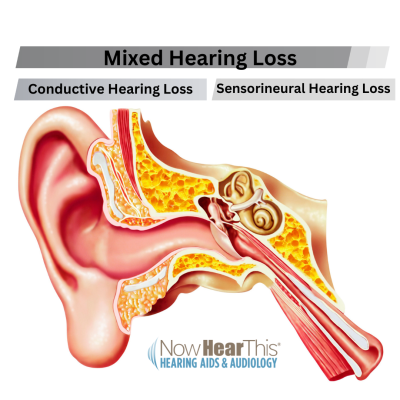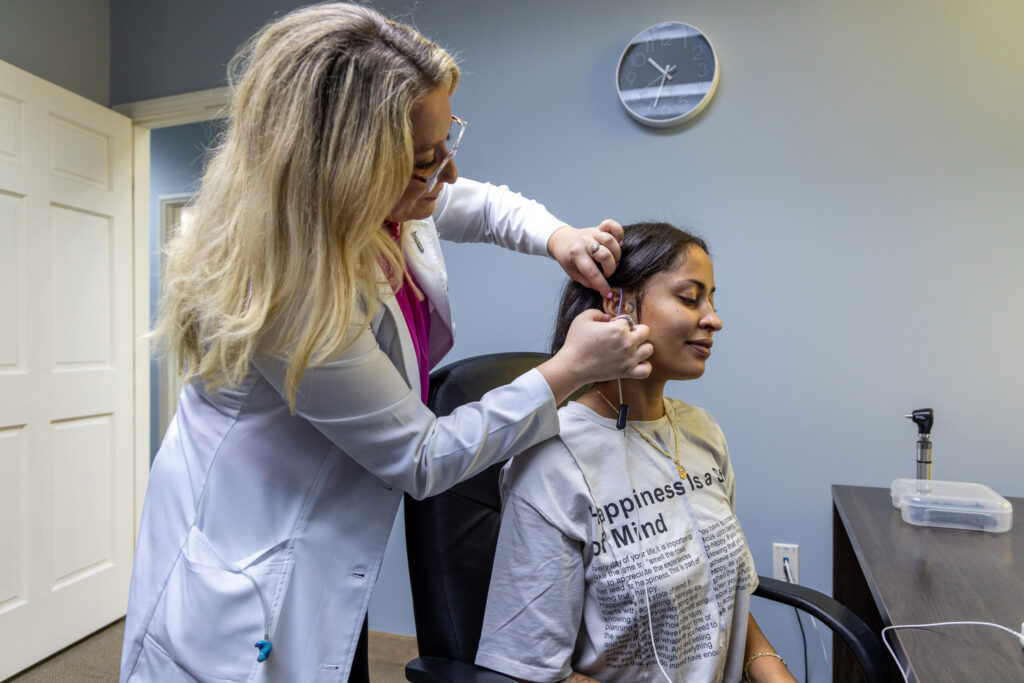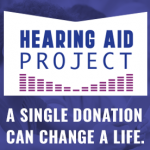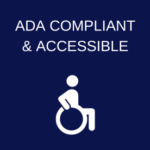Hearing Loss
The Basics of Hearing Loss
Types of Hearing Loss

1. Conductive Hearing Loss
Cause: This type occurs when sound waves cannot efficiently pass through the outer ear or middle ear to reach the inner ear. It is often caused by blockages such as earwax, fluid in the middle ear, ear infections, or damage to the small bones in the middle ear (ossicles).
Characteristics: Sound may be muffled, but the ear’s nerve function remains intact. Conductive hearing loss can often be treated medically or surgically.
Common Causes:
· Ear infections (otitis media)
· Eustachian tube dysfunction
· Earwax impaction
· Otosclerosis (abnormal bone growth)
At our Clinic: conductive hearing loss can be assessed via otoscopy, pure tone audiometry, and tympanometry. If conductive hearing loss is detected, our doctors of audiology would explain appropriate treatment or referral options.
2. Sensorineural Hearing Loss
Cause: Sensorineural hearing loss (SNHL) occurs when there is damage to the inner ear (cochlea) or the auditory nerve, which transmits sound signals to the brain. This type of hearing loss is typically permanent.
Characteristics: Sounds may be unclear or distorted, and people may have difficulty hearing both soft and loud sounds.
Common Causes:
· Aging (presbycusis)
· Noise exposure (loud concerts, machinery)
· Head trauma
· Ototoxic drugs (medications that damage hearing)
· Genetic factors
· Meniere’s disease
At our Clinic: a comprehensive case history typically provides insights as to the type of sensorineural hearing loss. Typical age or noise related hearing loss is commonly treated via prescription hearing aids. More nuanced causes such as ototoxic drugs, Meniere’s disease and more are treated on a case-by-case basis, with appropriate referrals as needed.
3. Mixed Hearing Loss
Cause: Mixed hearing loss is a combination of conductive and sensorineural hearing loss. This means that both the outer/middle ear and the inner ear or auditory nerve are affected.
Characteristics: It can be caused by a combination of factors like ear infections and aging.
Common Causes:
Injury or chronic infections may lead to mixed hearing loss, or it can develop over time.
At our Clinic: Mixed hearing loss typically requires a team approach with both Audiologist and ENT physician. We have excellent relationships with all the top ENTs in the triangle area and work closely with them to ensure both types of hearing loss are treated appropriately.
4. Auditory Processing Disorder (APD)
Cause: APD is a less common type of hearing difficulty that involves problems in how the brain processes sound rather than an issue with the ear itself.
Characteristics: People with APD may have normal hearing levels but struggle to understand speech, especially in noisy environments.
Common Causes:
Often diagnosed in children, it can result from brain injuries, infections, or developmental delays.
At our Clinic: As APD is a relatively new diagnosis, treatment is still somewhat experimental in the sense that most is not billable to insurance. If we find someone likely has APD, we typically refer them to a specialty clinic.
Hearing loss is typically measured in decibels (dB), and the degree of loss can vary:
· Mild: 26-40 dB (difficulty hearing soft speech)
· Moderate: 41-55 dB (difficulty understanding normal conversation)
· Moderately Severe: 56-70 dB (conversational speech needs amplification)
· Severe: 71-90 dB (unable to hear speech without amplification)
· Profound: 91+ dB (may not hear even loud sounds)
· Difficulty understanding speech, especially in noisy environments
· Frequently asking people to repeat themselves
· Turning up the volume on devices like TVs or radios
· Ringing in the ears (tinnitus)
· Avoiding social situations due to trouble hearing
· Hearing Aids: Used primarily for sensorineural hearing loss, these amplify sound.
· Cochlear Implants: A surgical option for severe or profound sensorineural hearing loss.
· Surgical Procedures: For conductive hearing loss, treatments may include removing blockages or repairing the ossicles.
· Assistive Listening Devices: These include devices that amplify sound in specific situations, such as phone amplifiers or TV listening systems.
* Hearing loss is best diagnosed through a hearing test conducted by an audiologist, who can determine the type and degree of hearing loss and suggest appropriate interventions.
Improved Hearing

Being able to hear clearly and understand conversation brings many advantages. It keeps us safe by alerting us of noises in our environment, such as when someone is knocking on the door, or when a high-pitched smoke alarm goes off.
Most importantly, improved hearing keeps us connected to our family, friends, and the community. The largest study* on the effects of treatment of hearing loss showed that people who chose to hear better with hearing devices reported the benefits of:
· Better relationships within the family
· Better feelings about themselves
· Improved mental health
· Greater independence and security
· Desire to participate in social and family events
The patients of Now Hear This® in Raleigh tell us about other benefits of improved hearing:
· Less fatigue from having to strain to hear
· Greater enjoyment of TV
· Improved hearing on the telephone
· Feel more connected and in-the-know
· Better performance at work
· More involvement with children and grandchildren
It has been found that individuals who make the decision to hear better obtain significant benefits most of which are noticed right away. Schedule a hearing evaluation today with Now Hear This® and see how your hearing and quality of life will improve.
[The Consequences of Untreated Hearing Loss in Older Persons. Nation Council on Aging, 1999.]
If you or a loved one is suffering from hearing loss and looking for an experienced audiologist, we can help at Now Hear This®. Our Doctors of Audiology will be able to determine the degree and type of your hearing loss and the best hearing treatment option.
The first step to improving your hearing is to determine the cause of your hearing loss. To properly diagnose your hearing loss and find the right treatment option to get you back to enjoying all that life has to offer, schedule an appointment with one of our audiologists at Now Hear This® by calling (919) 256-2898 today.
Our Services







